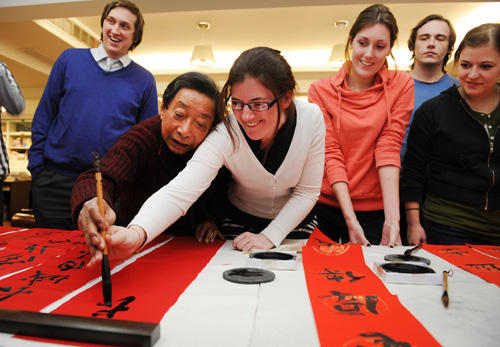|
 |
|
LONGHAND LEARNERS: Teachers at Sakura Foreign Language Training School in Hangzhou, capital of east China's Zhejiang Province, learn to write Spring Festival couplets on December 30, 2011 (CFP) |
Offer an average American on the street 10 dollars to correctly spell the word "restaurant," and you are likely to see beads of sweat form across their brow. If you really want to get inside their head, ask them to spell "psychology."
It is a difficult task for many adults whose memories of their first spelling bee have faded along with their early lessons in long division, but in English at least we can make semi-educated guesses when applying the written word. Erroneously writing "E-M-B-A-R-A-S," for instance, might be a cause of embarrassment for the speller, but most people wouldn't pass J-U-D-G-M-A-N-T upon someone for their mistake. We still get the idea.
Chinese, on the other hand, is a bit more complicated. I asked a friend recently to show me the character for "frog," and it was as though I had asked an English speaker to spell the word "accommodate." The same nervous look appeared on his face as he fiddled with a pencil, trying to recall a skill that had slowly abandoned him.
Finally my friend reached for both the partial cause of and the ultimate solution to this nationwide form of academic amnesia: their smart phone.
Punching the pinyin spelling into their iPhone, the correct characters for the word "frog" jumped up on the screen.
I've talked to other 20-something Chinese friends since then who have all said the same thing: Writing hanzi was a major part of their primary education, but those skills have dwindled with the growing pervasiveness of texting technology.
The trend is visible almost everywhere. On each subway commute people are typing away furiously on their phones, but not once have I seen someone with a writing utensil squeezed in among the masses trying to manually pen the complicated strokes of the Chinese script onto a piece of paper.
The art of the handwritten word seems destined to be replaced by whatever technological inventions arise to satisfy our need to get things done quicker. Writing by hand takes time; and these days we associate it with unpleasant tasks, like finishing an essay exam under deadline pressure, or filling out forms at the bank—only to be told by the clerk, "I'm sorry, sir, but there's an error in box 62b and I'm afraid we'll need you to fill out this entire form again."
After suffering from prolonged hand cramps as a student of Chinese while writing characters repetitively, following a careful order of strokes only to produce what looks like a toddler's attempt to draw a spider, I can't say I am opposed to the electronic writing revolution. I am a regular user of the text and voice messaging app WeChat, which has helped me gain familiarity with a greater volume of characters much faster than the traditional methods of learning. And should an unknown word arise, the answer is readily found with a quick copy/paste over to Google Translate.
There will be cultural purists and those who remain nostalgic for the old ways—like the people who, when electronic book readers were introduced, said, "But I just love the smell of an old book"—and many of their arguments will be worth hearing.
While some government officials may lament the texting masses, they can rest assured that the writing system itself is not going away. Until a person can write shi without about 100 different possible characters appearing, there will always be a need for the intricate and beautiful characters that make up the Chinese script. That, at least, is G-A-R-U-N-T-E-E-D. | 